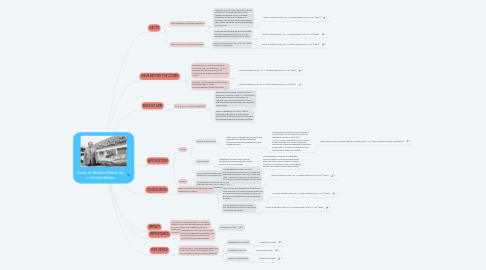
1. ISSUE BEFORE THE COURT
1.1. Hotel involve in racial discrimination even after the Civil Rights Act of 1964 explicitly banned this practice by prohibiting racial discrimination in public places.
1.1.1. Heart of Atlanta Motel, Inc. v. United States, 379 U.S. 241 (1964)
1.2. Whether Motel was affecting more than one state when it refuse accommodating African Americans
1.2.1. Heart of Atlanta Motel, Inc. v. United States, 379 U.S. 241 (1964)
2. FACTS
2.1. Hotel engage in interstate commerce
2.1.1. Appellant solicits patronage from outside the State of Georgia through various national advertising media, including magazines of national circulation; it maintains over 50 billboards and highway signs within the State, soliciting patronage for the motel;
2.1.1.1. Heart of Atlanta Motel, Inc. v. United States, 379 U.S. 241 (1964)
2.1.2. It accepts convention trade from outside Georgia and approximately 75% of its registered guests are from out of State
2.1.2.1. Heart of Atlanta Motel, Inc. v. United States, 379 U.S. 241 (1964)
2.2. Hotel Involve in racial Discrimination
2.2.1. Hotel refused to offer any of its 216 rooms to African-Americans.
2.2.1.1. Heart of Atlanta Motel, Inc. v. United States, 379 U.S. 241 (1964)
3. RULE OF LAW
3.1. Art. I, § 8, cl. 3, of the Constitution
3.1.1. The Commerce Clause refers to Article 1, Section 8, Clause 3 of the U.S. Constitution, which gives Congress the power “to regulate commerce with foreign nations, and among the several states, and with the Indian tribes.”
3.1.2. The Civil Rights Act of 1964, which outlawed segregation and prohibited discrimination against African-Americans, was passed under the Commerce Clause.
4. APPLICATION
4.1. Position
4.1.1. Heat of Atlanta motel
4.1.1.1. Motel owner claimed that Congress had exceeded its authority under the Commerce Clause by regulating a local private business.
4.1.1.1.1. The appellant contends that Congress, in passing this Act, exceeded its power to regulate commerce under Art. I, 8, cl. 3, of the Constitution of the United States; that the Act violates the Fifth Amendment because appellant is deprived of the right to choose its customers and operate its business as it wishes
4.1.2. United States
4.1.2.1. Interstate Commerce also include movement of people between states, and its not a local business
4.1.2.1.1. Unavailability to Negroes of adequate accommodations interferes significantly with interstate travel, and that Congress, under the Commerce Clause, has power to remove such obstructions and restraints
4.2. Analysis
4.2.1. Hear of Atlanta Motel did not provide evidence of just being a local bussiness
4.2.2. United States provide evidence that 75% of guests are from out of state which make Heart of Atlanta interstate bussiness
5. CONCLUSION
5.1. Heart of Atlanta Hotel did come under interstate commerce
5.1.1. The prohibition in Title II of racial discrimination in public accommodations affecting commerce does not violate the Fifth Amendment as being a deprivation of property or liberty without due process of law.
5.1.1.1. Heart of Atlanta Motel, Inc. v. United States, 379 U.S. 241 (1964)
5.1.2. Title II of the Civil Rights Act of 1964 is a valid exercise of Congress' power under the Commerce Clause as applied to a place of public accommodation serving interstate travelers
5.1.2.1. Heart of Atlanta Motel, Inc. v. United States, 379 U.S. 241 (1964)
5.1.3. Such prohibition does not violate the Thirteenth Amendment as being "involuntary servitude."
5.1.3.1. Heart of Atlanta Motel, Inc. v. United States, 379 U.S. 241 (1964)
6. IMPACT
6.1. Commerce Clause gave the U.S. Congress power to force private businesses to abide by Title II of the Civil Rights Act of 1964, which prohibits discrimination in public accommodations.
6.1.1. Commerce Clause
7. IMPORTANCE
7.1. Importance of case lies in its timing when Civil rights Act was passes and movement was at peak to finish discrimination at public entities
8. INFLUENCE
8.1. Over the years, there have been fewer and fewer instances of overt [direct] racial discrimination in public accommodations.
8.1.1. Katzenbach v. McClung
8.1.1.1. Commerce Clause
8.1.2. Affordable Care Act
8.1.2.1. Commerce Clause
8.1.3. Lopez v. United States.
8.1.3.1. Commerce Clause

